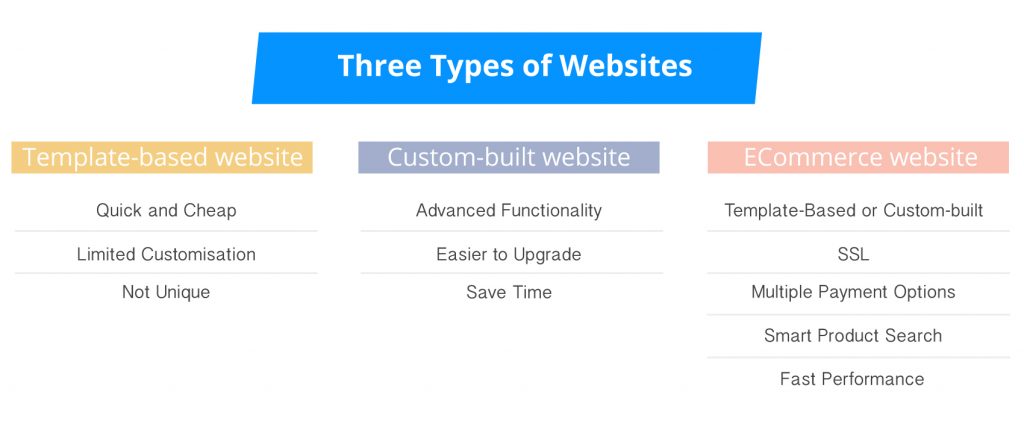Important Hints And Tips to Choose a Web Development Company

Today technology drives the world and having an excellent website is a way for a business to become eye-catching, deliver a stronger marketing message and gain loyal customers at a lower price. A well-built site will clearly state what products and/or services you offer. But how to find a software development company that will suit your needs? You can make a list of potential candidates, but choosing the best one for your business may be a challenge.
The web development business is growing fast since online presence is a must for virtually any company today. Each web development company will offer a different scope of services, based on their own business processes, and providing certain quality at different prices.
If you are planning to grow your business online, but you don’t know where to begin, continue reading this post. We will uncover how you can avoid making a mistake when you are selecting the service provider and what questions you should ask during the interview.
Enhance Your Business Image with the Right Web Development Service Provider
Software development includes a wide range of practices and services and solves all kinds of business and technology needs. It can be design development, website update and upgrade, blockchain development or IoT. Web design services comprise a narrower scope of services and deal with the front-end, i.e. visual aesthetic of a website. Web development does both front-end and back-end, combining aesthetic and functionality.
Based on business goals, there are three types of websites you could choose from, depending on your goals and budget. They are:
1. Template-based website. Many businesses use these websites because their development is quick and cheap. You may have heard about WordPress which offers a variety of customizable templates. There are some drawbacks with template-based websites. Despite the ability to customize them and make relatively unique-looking, a template is still a template. Therefore, all the sites that use the same template will look similar.
2. Custom-built website. Custom web development service is about creating a one of a kind website with advanced functionality. All its elements are created with your business in mind. A custom-built site will often save time in the future because it’s easier to upgrade in alignment with your business goals. It might take more time initially to create the site, but your site will likely be more focused on your exact business needs.

3. ECommerce website. This site can be template-based or custom-built. Either way, they are online shops equipped with a catalogue, shopping cart, and payment gateways. You can use it even if you have only one product to sell. Their goal is to promote a visitor to purchase from you. These websites use SSL for secure transfer of a client’s personal data. The key features of an eCommerce website are multiple payment options, smart product search, and fast performance.
These websites go through a set of development stages. What’s important to know is that not every web development company can manage all stages. While searching, you may encounter companies that provide only back-end or front-end services. It may seem strange to build one website with the help of several companies. But there are also companies that do full-cycle web development. These companies have several departments other than development and design. They also have project management and QA testing departments. This option is the most convenient, but more expensive, since it will involve different experts during the development process.
How to Choose a Web Development Company and Avoid a Mistake
Once you figure out what type of website your business needs, your terms and budget, you will decide what service provider is the best choice for your business.

Consider the following tips to choose a web development company and the issues that may arise by overlooking crucial points.
1. Decide what features your website should have. You should first determine how many pages you want your website to have (other than the home or contact page) and its key features.
N.B. A template-based website may have limitations in adding some features. Too many features may make your website user-unfriendly and visitors will have to wait longer for it to load (which can irritate and, therefore, create a negative experience). However, no matter what type of site you build, try to consider your own web experience and what features similar to yours were unnecessary and what features a website didn’t have.
2. Visit the company’s website. Check their digital presence, including their official website (look at the mobile version too), social media profiles and read content on their blog.
N.B. If they promise cutting-edge and new solutions but do not use any of those on their site, it raises a question about the company’s expertise.
3. Check their portfolio. If they don’t have one, ask them to do a test for you. Also, ask how many similar sites in the same niche as yours they have launched successfully. Visit those sites and check how smoothly they work (namely, pay attention to UI and UX).
N.B. A lack of real examples or poor performance of websites from the portfolio reduces trust and reliability.
4. Check what their clients say about their work on websites such as Clutch, which gather reviews about businesses from around the world. Pay attention to reviews of projects similar to yours. You may also check their overall rating and if they have any awards.
N.B. Try contacting one of their previous clients and ask about their experience with the company.
5. Make sure they are responsive. Regardless of whether it is a small company without a sales department or a bigger one, contact them to see how they answer to you, how fast and polite they are and how much interest they have in your business.
N.B. Allow them time to answer your questions if it is email correspondence. If they keep you waiting or try to hard sell from the start, be cautious.
Questions to Ask a Web Development Company Before You Begin Your Project
A website connects your business with your target audience and future clients. Top software developers know that credibility and trust are important, and you are most likely forming long-term relationships with the company.
At this point, you may still have some unanswered questions. Let’s look at five questions that will help you understand the workflow of any web development company.
- Do you have case studies? An experienced web development company will provide examples of cases, describing the projects they have developed. They may contain information about the development process from the first steps to the finish line. This will give you a better picture of their capabilities and expertise.
- What are the stages of your website development process? Typical stages of web development are analysis and research, prototyping, design development, coding, and testing. During all development stages, you will be involved in the revision and approval process, so you may as well ask if there is a specific person you’ll be in touch with during all stages.
- How long does each stage last? You can also ask what happens if they don’t meet their deadlines and what are their obligations? Their methods of time estimation should be transparent and should account for possible delays during the implementation stage. You should also ask how the cost is calculated based on the proposed time frame.
- What is my role in the development process? You’re not a developer, but you’ll be part of the team. A reliable company that cares about the quality of their work will make your role clear and will keep you involved and informed throughout the entire development process (i.e. Provide mockups and wireframes for you to ensure they are meeting your expectations.)
- After you’ve discussed your business goals, check how well they understand them and if they can provide advice and consulting assistance. A good web company should be able to provide knowledge and experience about the technical and non-technical aspects of development.
If you already have a website, but you want it to be polished or move to a new one, ask if they will review, analyze and evaluate your current site’s strengths and weaknesses and take this into consideration before starting the design and development process.
What About Web Development Cost?
Our tips to choose a web development company wouldn’t be complete without discussing your project budget. The following factors typically affect the development cost:
- The number of website pages and their overall complexity
- The functionality of all added features
- Database integration
- Responsiveness and integrity of the design
- Local or outsource. The cost of outsourcing web development to eastern Europe is generally lower than hiring a local development team, especially in the USA or Australia
- Domain name and website hosting
- SSL Certificate
- Integration with third-party applications, such as payment and shipment gateways, CRM, accounting packages, or ERP
- Routine maintenance
A low development cost should not be the primary factor in deciding how to choose a web design company. You might find prices that are very low, but the results will disappoint you.
You can better determine the actual price of your project once you contact a web development company and they provide an estimate plan. Consider the following example with companies A, B, and C. Company A isn’t a company specializing in web development, but a freelancer which can build a simple website, usually template-based with a low level of customization and without the experience of working on complex projects. This doesn’t mean ‘Company A’ can’t make a design that will work. The decision is more about your business needs and whether a simple design is adequate.
Unlike A, Company B has more experience with customization. Their services will cost more and the development will take more time. While they may not offer all the services of a larger company, their design may be closer aligned with your goals.
However, if you need a unique website with a special set of features and architecture, it’s probably a job for Company C. They are the most expensive, but also the most experience. Their web development takes longer, but the customization they provide is most likely to meet your needs.
| Company A | Company B | Company C | |
| Personnel | Freelance | Small Studio | Development Agency |
| Customization | 2 out of 5 | 3 out of 5 | 5 out of 5 |
| Experience | 2 out of 5 | 3 out of 5 | 5 out of 5 |
| Budget | $$ | $$$ | $$$$$ |
| Time | Under 2 months | From 2 to 4 months | From 4 to 6 months |
A strong online presence is vital in our technology-driven world. It is a proven way of building an effective marketing communication channel with your customers.
If your budget does not permit investing into a feature-rich website, you may start small and opt only for the essentials that you can afford. Over time, as your business grows and evolves, you will better understand what important functionality should be added and make preparations to invest in web development.
We hope this article helps you clarify some larger concerns regarding choosing a web development company. Alternative-spaces has been serving international clients in web development, UI/UX design, and quality assurance for many years. Give us a chance to show you how we can help you with your project.
Content created by our partner, Onix-systems.
 Home
Home